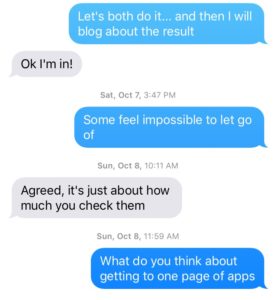Smartphone Addiction: Is it Making Your Dumb?
Dan Kersten told me that his rock bottom smartphone moment came when his wife asked his son, Ben, what he loves about his Dad.
“He gives me hugs, he makes cool things out of cardboard, and he’s always playing with his phone,” Ben responded.
And that, Dan says, is when he realized he was addicted to his phone. Have you had that realization yet?
Are You Addicted to Your Phone?
Dan remembers a time when he hated texting and using his phone. But then that all changed. Dan had become tethered to his iPhone. He recently reflected on how ingrained he’d become with text, email, weather, news, podcasts, and games.
“It’s a habit. I feel this anxiety to do it all the time and only have relief when I’ve done it,” he revealed. “Any chance I get — on the elevator, waiting in line…all throughout the day.”
Have you been there?
Dan went on to tell me that he’d see his phone or feel it in his pocket and think:
There are probably a bunch of emails or texts on there. Maybe someone needs something…Maybe I’m missing something. I can do those things right now. If I don’t do it now it will weigh on me. Before I can be fully present with others, if I’m really going to relax, I need to clear out my inbox and respond to people.
I’ve been there too many times myself.
Liberating Yourself From the Addictive Brain Drain
Recently, Dan and I read this article citing research that shows smartphones are leading to addiction and “brain drain.” The phones may be smart, but they’re actually making us dumb.
So we both decided to change this habit.

I’ll be honest. It was really hard.
I removed dozens of apps, reducing it down to only the apps I could see in my home screen without swiping left. I turned off app notifications, and I re-committed to no work email on my phone. (I first made this commitment as an experiment two years ago and have not gone back. I care deeply about my job and my clients, but my mental health comes first.)
Dan also removed all text notifications, including the red circle that appears on apps when you have unread messages. He now only checks his phone four times per day or when absolutely necessary. He puts it in a different room with the ringer volume up high, and when he does use his phone, he “gets in and out as quickly as possible.”
It has been nothing short of liberating for both of us. We’re more present with others, we realize we’re really not missing anything important, and we are less anxious.
After two weeks of liberation, Dan did get a big work project that prompted the need to be on his phone a lot for work email communication throughout day. While waiting for emails, he admits that he got back to old habits, albeit with just a bit more awareness. It’s a hard habit to shake.
Perhaps like other addictions—to food, alcohol, work, etc.—the smartphone addiction emerges out of rational or benign circumstances. But the reason the addiction becomes an addiction may not be so obvious.
When other areas in life are overwhelming or out of control, your phone might seem like one place where you can have peace and control. And then there’s the pressure we all feel to remain busy, never bored, always on top of things.
Dan and I want to mitigate our addiction to our phones, ensuring that they are a tool, not a crutch or a salve. So we will keep running experiments and setting up guardrails.
Our next experiment will be to do a cleanse the first week of every month, substantially restricting usage to get it back in check.
What are you doing to keep it in check? If you haven’t thought about it, there’s no time like the present. Because your smartphone just might be making you dumb.









Comments are closed here.